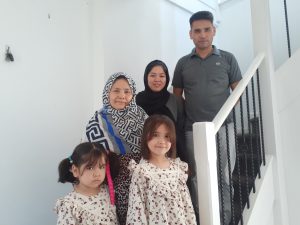Refugee family’s journey to safety
As an archivist and technical officer with the Afghan Government Eshaq Yaqubi worked in a prestigious job just metres away from the office of the last elected president of Afghanistan Mohammad Ashraf Ghani.
But it was that proximity to the centre of power that put a target on his back when the Taliban took control of Kabul in August, 2021.
After a two year ordeal which saw Eshaq and his family hide in basements, sneak across the Pakistan border and languish in overcrowded refugee camps, they have resettled in Melbourne where they are rebuilding their lives.
 Eshaq said he felt fleeing Afghanistan was his family’s only option after the Taliban dramatically seized control of the country.
Eshaq said he felt fleeing Afghanistan was his family’s only option after the Taliban dramatically seized control of the country.
“When the Taliban came we had to leave. I had experience working with US forces and companies and I had worked in the President’s office for some years, so it was clear that we had to leave or we would have become targets of the Taliban,” he said.
Eshaq, his wife Masoma, two young daughters Mahla and Mahdia, and his mother Khadija , spent two months in hiding in Kabul waiting for visas and flight details from the embassy of the UAE.
“But with the Taliban in control of the airport, there were not flights we could get on,” Eshaq said.
“We lived in hiding for two months. We found a cellar underneath a building in Kabul and we were able to live there quietly,” he said.
“Eventually we went to Pakistan overland where we were able to get visas and flights to Abu Dhabi.
The trip to Pakistan was difficult. There were security checks and there was chaos at the border crossing but Eshaq was able to pay some people to get the family across.
Eshaq had worked in the Presidential Palace in the archive section, close to the office of President Ashraf Ghani. He remembers vividly the day the city and palace fell to the Taliban.
“When the Taliban came to Kabul, I was in my office. I left the office around 12pm, around the same time I was told later the President left the country, and headed home.
“An hour or so later the Taliban came and took control of the palace. I left the office with some of my colleagues but there was confusion on the street.
“I was very worried. There were people moving around in the public places but no one really knew what to do or where to go.
“Most of the government military forces had left their posts and run away and the Taliban had surrounded Kabul.
“On my way home, my sister, mother and wife called me asking where I was. But I couldn’t find a taxi or a car to get home.
“After about two or three hours I got home and was told the Taliban had taken control of the ARG Palace.
“Everyone was very worried about the situation. We all knew what the Taliban had done the last time they were in power – they killed a lot of people.
“In Kabul, in particular, there were so many government, foreign NGO and military employees who were at risk.”
When he arrived home, Eshaq realised the Presidential Security Force had all of the staff personal information stored in the palace – including his ID documents, address and other personal details.
“So, the day after the fall of Kabul, the 16th, we changed addresses,” he said.
“Some of our neighbours who lived in our street were arrested. We don’t know what happened to them.
“After we left Afghanistan and reached Abu Dhabi we were told about a family we knew at the last place we had lived in Kabul.
“They had three sons. One of them was a university student who just disappeared one day. Three weeks later the family found him dead. He had been burned and his body dismembered.
“The family asked the Taliban who had done this. They didn’t respond. It was terrible, the son was just a student; he wasn’t involved with anything political.”
Eshaq says he fears for the future of his homeland.
“There is not any future for people in Afghanistan. Day by day, the Taliban is repressing people more harshly, especially women. They can’t work, play sport or participate in social activities,” he said.
And Eshaq has Now, Eshaq says he has fears for family members still in Afghanistan.
“My father and three sisters are in danger because the Taliban are searching for them. One of my sisters was active in women’s sport,” he said.
“My sister was part of a group that were secretly playing sport and exercising. The Taliban found out and threatened them.
“They are trying to find a way to get out of Afghanistan. We have applied for humanitarian visas for them and we are waiting for them to be processed,” he said.
Eshaq says he and his family feel well supported since arriving in Australia on humanitarian visas.
“Since we came to Australia everything has been very good for us. I have a good connection and relationship with my case manager at AMES Australia Ifaket Sumertas and my housing worker Mr Law Baw.
“Everything was arranged for us and we are all happy and looking forward to getting on with our lives in Australia.
“I am now also looking for a job. I want to start work and earn money. I want to support my family members in Afghanistan as well as my family here.
“I worked as an archivist in Afghanistan but it is difficult to find work in this area so I would like to find a job in construction, in which I also have experience,” Eshaq said.












